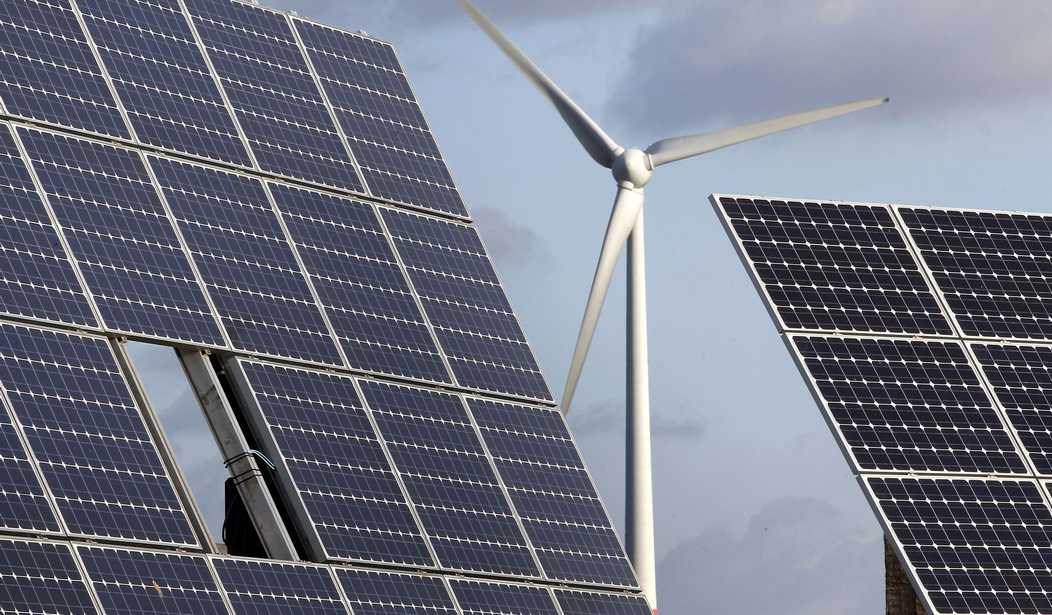There are a lot of problems with the various "green energy" schemes that always seem to come from leftist activists and politicians. Energy density is a huge problem with these schemes; the only carbon-free method of electrical generation that involves an increase instead of a decrease in energy density is nuclear power, and the Green New Deal types in the United States and elsewhere aren't fond of nuclear power.
Another problem is economic. Supply and demand apply to energy, as they apply to everything, and when the supply decreases, costs increase. But electricity is something of a fixed requirement for most people. Our homes and businesses depend on constant, reliable, and affordable energy, electricity in particular. But green energy schemes are not constant, they are unreliable, and are not affordable - and will also inevitably lead to rationing. In fact, in the United Kingdom, that is already being tacitly acknowledged.
And it's all because of the UK's net zero ambitions.
It was the warning Ed Miliband didn’t want to hear.
Days after the Energy Secretary pledged low-carbon power for all at Labour’s annual conference, energy giant EDF discussed plans to close four of the UK’s five remaining nuclear power stations.
Two are currently scheduled to close in 2026, followed by another two in 2028.
“They can’t go on forever,” said Rachael Glaeving, commercial director at EDF’s UK business.
“Any life extension of these power stations is going to be measured in months.”
The decision, announced after thorough engineering reviews, is set to make Miliband’s dream a lot harder. He has promised to deliver a net zero power grid by 2030, although in practice this is expected to mean 95pc green energy – with the remainder coming from burning gas.
Note that these five reactors are already supplying clean, reliable, high-energy-density electricity to Britons. And even if these reactors are outdated and must be closed, a sensible policy decision would be to build new ones - but that's not what the UK is planning. Because of climate change!
As Britain’s reactor fleet shrivels, the amount of nuclear capacity will fall from six gigawatts (GW) today to just 1.2 GW by 2028 or soon after. Along with rising demand from power-hungry data centres and technologies of the future, it will make it even harder to keep the lights on when wind and solar generation is low.
Against this backdrop, the National Energy System Operator (Neso), the newly nationalised body overseeing the electricity grid, is turning to households and businesses to help balance the system.
Last week, it announced year-round plans to manage demand by paying consumers to cut their electricity usage at times of tight supply.
The so-called demand flexibility service has been billed as a forward-looking way to manage an increasingly complex and “smart” system, as we move from using a small number of large coal and gas-fired plants to relying on a plethora of intermittent sources of wind and solar power – backed up by batteries, energy-storing giant flywheels, interconnectors and other gadgets.
Yet some critics warn this all looks strikingly similar to rationing, especially coming at a time when electricity production continues to fall.
It looks strikingly similar to rationing because it effectively is rationing. And if the plan is to pay consumers to cut usage at times of tight supply - where is that money coming from? Those plans never seem to take that into account, probably because the pols that are ultimately behind all these schemes are accustomed to spending money as though it were water.
See Related: Kamala Harris on Energy Policy: America's Worst Nightmares Come True
Harris Mistrusted in PA - Keystone State Energy Workers Say
'Nobody Believes' What She Says
There is a stumbling block in all this "net zero by 2030" plan, and that's reality. At present, the United Kingdom's national grid is powered by:
- Natural gas: 20.09 gigawatts/55.6 percent
- Solar: 0.00 gigawatts/0 percent
- Wind: 3.84 gigawatts/10.6 percent
- Hydroelectric: 0.64 gigawatts/1.8 percent
- Nuclear: 3.91 gigawatts/10.8 percent
- Biomass: 2.95 gigawatts/8.2 percent
The "non-green" energy sources, natural gas and nuclear, make up over 65 percent of Britain's energy generation, and the Energy Secretary of that country intends to replace all of that with intermittent, unreliable, low-energy-density "green" sources. In six years. Oh, the grid will still be powered in part by natural gas - reduced from 55 percent to 5 percent.
In six years.
This is precisely what I've been warning about. Whether this be by design or incompetence, "Green New Deal" in all but name politicians and bureaucrats are trying to put in place green-energy schemes, in the name of climate change, that will badly impair our modern technological lifestyle. In Britain, we are seeing warnings of possible electricity rationing, which is as stark an illustration of this as we're likely to find.
Fair warning: We are one election away from this happening here.















